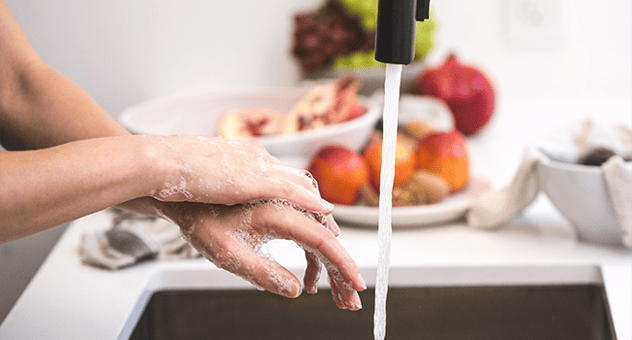If your restaurant is selected for a random health inspection, it’s important not to panic. Venues that are diligent about their food safety shouldn’t have any problems, and you’ll be able to take pride in the results when you pass with flying colors.
But it’s still a good idea to understand what happens during a health inspection, because even the smallest things can let you down. Knowing what inspectors look for will help you and your staff keep on top of your food safety obligations.
What are health inspectors legally allowed to do?
While different countries will have different regulations around public health inspections, there are certain things you can expect no matter where you live.

A health inspector is allowed to visit your venue at any reasonable time without notice. As part of their job, they’re obligated to do a certain number of inspections a year (once every six months is common), but they’re also required to do an inspection if a customer complains.
TIP: Visit your local health department website and look up inspection reports for restaurants in your neighborhood. Find out what violations are common so you can pay particular attention to those areas.
Make sure you ask them for their credentials before letting them into your kitchen. People have been caught impersonating health and safety inspectors, so if their behavior strikes you as suspicious, it’s all right to call your local health department to make sure they’re authorized. Train your staff so they know to do the same if you’re off site.
You cannot and should not refuse a health inspection from a licensed officer. However, it’s fine to follow the inspector around, answer their questions, ask them to explain their findings, and make notes if they find violations. They may request access to certain areas, make copies of documents, take photos, film videos, collect samples, conduct tests and seize items. It’s important to remain cooperative throughout all of this and to quickly fix any issues they find.
What is a health inspector looking for during an inspection?
Your local health department should list their food inspection criteria on their website (often they will have a downloadable checklist that you can use for your own inspections).
To give you a general overview, here are their main focus areas.
Food contamination
A health inspector will want to ensure that your food is being stored correctly, so that it’s protected against contamination. That means raw foods should be separated from ready-to-eat foods, and ingredients should be kept in food-grade containers with tight fitting lids. Storing questionable items near your food, like cleaning chemicals or personal belongings, will definitely get you into trouble.
What will get you marked down
- Food is being stored uncovered
- Food is being stored too close to the ground in your storeroom
- You're using inappropriate containers
- You're not labeling food with use-by dates
- Your menu descriptions are misleading (for example you haven't disclosed the presence of nuts)
- Employees aren't wearing gloves when preparing ready-to-eat foods
- You're storing cleaning products near food in your pantry
- You're storing table linens or utensils in inappropriate areas
- You're allowing food handlers to have cell phones near them while preparing food (on counter tops or chopping boards)
- You're storing raw ingredients underneath dripping meat in the refrigerator
- There are signs of pests near your storage facilities
Temperature control
Food poisoning commonly occurs because your ingredients aren’t being stored at safe temperatures. Health inspectors will spend a lot of time checking the temperature of your food and storage areas.
They will also ask for evidence that temperature checking regularly takes place, and for information about your temperature measuring devices.
What will get you marked down
- Foods have an unsafe internal temperature
- Hazardous foods have been left out in the open
- Display foods aren’t being protected by temperature control
- Storage areas aren’t the correct temperature
- Reheating procedures aren’t being followed properly (inspectors may ask employees what temperature they reheated food to and for how long to make sure it reached 165 °F or 73.8°C)
- Refrigerators aren't adequate (for example you’re using a domestic fridge)
- There’s no temperature-checking log
- There’s no temperature measuring device readily available
- Foods are left outside after a delivery and not refrigerated
- Frozen food deliveries are accepted partially thawed
Hygiene
If you’re spot on with your food safety, then handwashing probably seems like a no-brainer step to you, but it’s amazing how many venues fail their health inspections because they don’t have proper handwashing facilities.
Inspectors will also want to ensure that your food handlers are practicing proper hygiene when preparing meals, which means no dirty aprons!
What will get you marked down
- Food handlers don’t have an appropriate food safety certificate
- Food handlers have dirty clothing or long untied hair
- People are smoking inside the kitchen
- Food handlers with open wounds or rashes are touching food
- Food handlers aren’t washing their hands after stopping and starting food prep
- There’s no separate designated handwashing area
- There’s no access to warm running water for handwashing
- Your handwashing station is too far from your food preparation areas
- There’s no liquid soap or disposable paper towels at your handwashing station
- There’s nowhere to dispose of paper towels
- The handwashing station is blocked
- The handwashing basin is being used for other purposes (cleaning utensils, etc.)
General cleanliness
A dirty kitchen breeds bacteria. Make sure all floors, walls, ceilings, fittings, fixtures, equipment and food preparation surfaces are clean, and that there are no signs of pests or mold. It also needs to be clear that food waste is being disposed of appropriately.
What will get you marked down
- There is dirt or grease on the walls, on the floors or on benches
- There’s a an excessive build up of food waste on benches or inside fryers, ovens, and other cooking equipment
- There are signs of vermin or insects
- There are no proper garbage disposal facilities (bags are being left on the ground in the street), or garbage facilities aren’t covered and rodent proof
- Garbage isn’t being cleared regularly
- Garbage is being kept in food storage areas like the cool room
- There’s no proper ventilation, which means smoke, fumes and steam are lingering in the kitchen
Health
If your kitchen staff are handling food and there are signs that they are sick, your business is putting public health at risk, and you better believe you will be penalized for it. According to the CDC, 20% of food workers have admitted to working at least one shift while suffering from contagious symptoms like vomiting or diarrhea. Often, this will happen because food workers are unaware of sick leave policies. Don’t let your venue be included in this statistic.
A health inspector will probably ask you questions about foodborne illnesses to make sure you understand the consequences of allowing employees to work while sick.
What will get you marked down
- There are signs your staff are handling food while ill
- Staff are unaware of your health and hygiene standards when questioned
- You don’t have adequate lighting in your kitchen
What happens if you have a food safety breach?
So now that you understand what health inspectors are looking for during their visit, what should you do if you’re hit with a violation?
 If it’s something minor, it’s likely you’ll be given the chance to address the issue on the spot, or within a certain timeframe. Depending on the inspector’s criteria, you might not be penalized for these smaller items (though they will be recorded). However, you may face a follow-up inspection to see if the issues have been resolved. Use this time to reemphasize the importance of food safety to your team, and retrain them if necessary.
If it’s something minor, it’s likely you’ll be given the chance to address the issue on the spot, or within a certain timeframe. Depending on the inspector’s criteria, you might not be penalized for these smaller items (though they will be recorded). However, you may face a follow-up inspection to see if the issues have been resolved. Use this time to reemphasize the importance of food safety to your team, and retrain them if necessary.
If the violation is something more serious, you may be required to close your venue until it’s fixed. You could also be fined thousands of dollars.
If you don’t comply with an improvement notice or you want to fight it, you could end up in court. In extreme cases, venues have been permanently closed.
It’s important to note that your violations will be publicly listed on your health department’s website. And if your offences are particularly bad, a local journalist might decide to pick up the news, leading to some very bad PR for your venue.
The moral of the story is, don’t get caught out like this. Be smart about your food storage and the cleanliness of your restaurant. Train your staff to clean their designated areas every day. Ensure you have a Food Safety Supervisor on your staff, and conduct regular (weekly) food safety checks. That way, when you’re hit with a surprise inspection, you’ll be ready for it.
You might also like